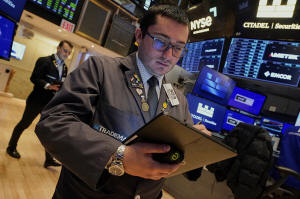Stocks rally worldwide after Trump eases some of his tariffs on
electronics, for now
[April 15, 2025] By
STAN CHOE
NEW YORK (AP) — Stocks rose worldwide Monday after President Donald
Trump relaxed some of his tariffs, for now at least, and as stress from
within the U.S. bond market seems to be easing.
The S&P 500 climbed 0.8%, though trading was still shaky, and it briefly
gave back all of its big early gain of 1.8%. The Dow Jones Industrial
Average rose 312 points, or 0.8%, and the Nasdaq composite added 0.6%.
Apple and other technology companies helped lift Wall Street after Trump
said he was exempting smartphones, computers and other electronics from
some of his stiff tariffs, which could ultimately more than double
prices for U.S. customers of products coming from China. Such an
exemption would mean U.S. importers don't have to choose between passing
on the higher costs to their customers or taking a hit to their own
profits.
Apple climbed 2.2%, and Dell Technologies rose 4%.
Automakers also rallied after Trump suggested he may announce pauses on
tariffs next for the auto industry. General Motors rose 3.5%, and Ford
Motor rallied 4.1%.
All told, the S&P 500 rose 42.61 points to 5,405.97. The Dow Jones
Industrial Average gained 312.08 to 40,524.79, and the Nasdaq composite
climbed 107.03 to 16,831.48.
But such relief may ultimately prove fleeting. Trump’s tariff rollout
has been full of fits and starts, and officials in his administration
said this most recent exemption on electronics is only temporary.
That could keep uncertainty high for companies, which are trying to make
long-term plans when conditions seem to change by the day. Such
uncertainty sent the U.S. stock market last week to chaotic and historic
swings, as investors struggled to catch up with Trump’s moves on
tariffs, which could ultimately lead to a recession if not reduced.

China’s commerce ministry nevertheless welcomed the pause on electronics
tariffs in a Sunday statement as a small step even as it called for the
U.S. to completely cancel the rest of its tariffs. China’s leader Xi
Jinping on Monday said no one wins in a trade war as he kicked off a
diplomatic tour of Southeast Asia, hoping to present China as a force
for stability in contrast with Trump’s frenetic moves on tariffs.
Elsewhere on Wall Street, Goldman Sachs rose 1.9% after reporting a
stronger profit for the latest quarter than expected. It joined other
big banks in doing so, such as JPMorgan Chase and Morgan Stanley.
Perhaps more encouragingly for Wall Street, the bond market also showed
signs of increasing calm. Treasury yields eased following their sudden
and scary rise last week, which seemed to rattle not only investors but
also Trump.
[to top of second column] |

Trader Drew Cohen works on the floor of the New York Stock Exchange,
Monday, April 14, 2025. (AP Photo/Richard Drew)
 Treasury yields usually drop when
fear is high in the market because U.S. government bonds have
historically been seen as some of the world’s safest investments, if
not the safest. But last week, yields rose sharply for Treasury
bonds in an usual move. The value of the U.S. dollar also fell
against other currencies in another move suggesting investors may no
longer see the United States as the best place to keep their cash
during moments of stress.
Trump noted the moves in the bond market, which suggested investors
“were getting a little queasy,” after he announced a 90-day pause on
many of his tariffs last week.
That Trump acted only after the bond market made its scary move, but
not after U.S. stock market began trembling, “reveals this
administration’s Achilles’ heel,” according to Lisa Shalett, chief
investment officer at Morgan Stanley Wealth Management.
The yield on the 10-year Treasury eased back to 4.37%. It had jumped
to 4.48% on Friday from 4.01% the week before.
Yields sank after the bond market got an encouraging update on
expectations for inflation among U.S. consumers. While U.S.
households raised their expectations for inflation in the year
ahead, their expectations for inflation three and five years in the
future were either unchanged or lower, according to a survey by the
Federal Reserve Bank of New York.
That’s potentially good news for the Federal Reserve, which hates to
see fast-rising expectations for longer-term inflation. Such
expectations could kick off a feedback loop that drives behavior
among consumers that only worsens inflation.
The value of the U.S. dollar, though, remained under pressure. It
slipped against the euro and Japanese yen, while inching higher
against the Canadian dollar.
In stock markets abroad, indexes climbed 2.4% in France, 2.9% in
Germany, 1.2% in Japan and 1% in South Korea.
In China, stock indexes rose 2.4% in Hong Kong and 0.8% in Shanghai
after the government reported that China’s exports surged 12.4% in
March from a year earlier in a last-minute flurry of activity as
companies rushed to beat increases in U.S. tariffs.
___
AP Writers Jiang Junzhe and Matt Ott contributed.
All contents © copyright 2025 Associated Press. All rights reserved |